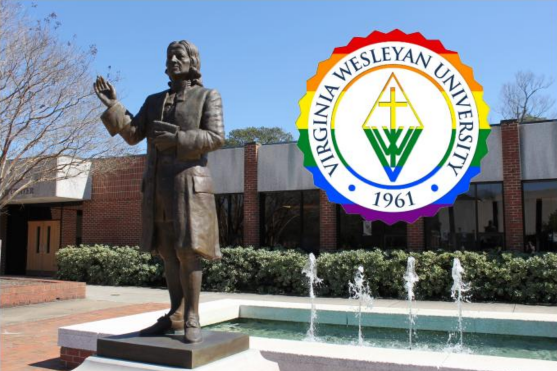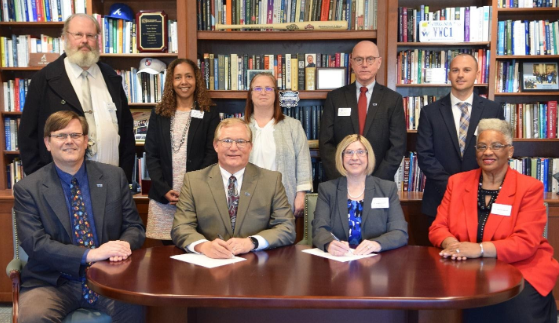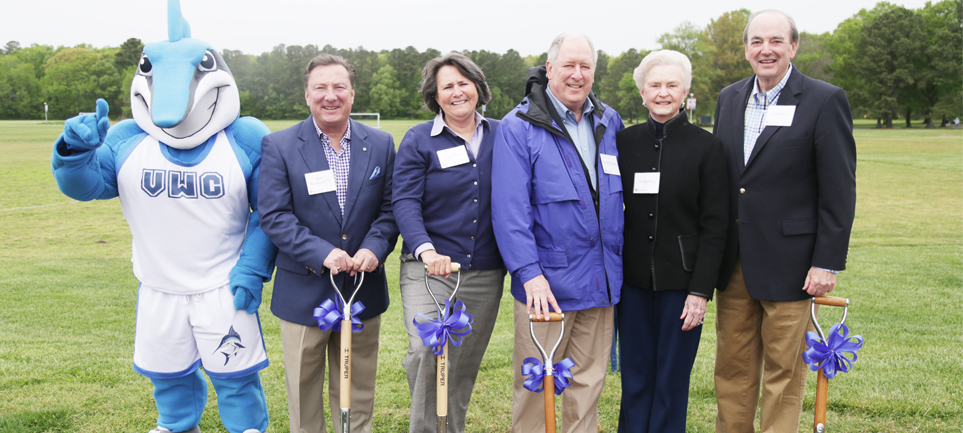VWU vows to remain inclusive to all people despite the United Methodist Church’s decision to ban LGBTQ+ from obtaining leadership.
The United Methodist Church (UMC) voted 53-47 in Feb. to ban gay clergy and officiating LGBTQ+ weddings. The outcome of such a long-anticipated vote stunned and disappointed those eagerly awaiting the results of the UMC General Call, a yearly summit to discuss and vote on church matters. Though many points of discussion have caused controversy in the church over the years, perhaps none has caused as much conversation as the intersection of religious doctrine and LGBTQ+ rights.
The debate and resulting vote spanned three days. Such a decision appears to contrast the UMC’s new motto, ‘open hearts, open minds, open doors.’ In addition to the bans, punitive measures were also instituted to punish clergy members who officiated same-sex marriages: first-time offenders may be suspended without pay, while those who continue to defy the church may be defrocked.
President Miller denounced the decision and said that Wesleyan would not be following this new doctrine.
“The vote we consider to be disappointing. We are welcoming and educating in an equitable and inclusive environment and the vote won’t erode our commitment to inclusion and diversity,” Miller said. “We are committed to inclusiveness.”
Senior Melissa Fisher said this topic arose during her meetings with the administration to implement a transgender-inclusive housing and nondiscrimination policy on campus. Fisher is the president of Spectrum, an organization that promotes LGBTQ+ rights and education. “It really just came up in context of, you know, ‘we have your back, we’re here,’ ‘we’re trying to support you, we believe this is the correct step for the future of Virginia Wesleyan University,’” Fisher said.
“Honestly, I see this more in terms of a loss for the church. I am really glad that President Miller has distinguished our campus from the formal church’s policy on this issue. Not only is this the right thing to do morally, but we need to remain and inclusive, welcoming institution that changes with the times,” Associate Professor Kathleen Casey said. Casey is the advisor for and founding faculty member of Spectrum.
Spectrum Vice President Kayla Bennett called the decision “disappointing, but not surprising.” She also expressed hope that the higher administration would continue to support Spectrum and other organizations that promote diversity. “We, LGBTQ+ identifying students, need to be supported and uplifted by the VWU administration in order to thrive as individuals and as a community,” Bennett said.
“More and more people continue to identify as LGBTQ+ and/or have friends and family members who identify as such. [Wesleyan is] a place where everyone can pursue their education regardless of their sexual identity or religious affiliation,” Casey added.
The growing LGBTQ+ community is what eventually caused Justin Robins to change his mind, who is both a Spectrum member and heavily involved in the UMC community. “When homosexuality stopped becoming a hypothetical problem and it started becoming people in my life who truly loved and cared for one another, my mindset totally changed,” Robins said. After his aunt married her partner, he said that he felt like he “realized that this was a situation in the church that really mattered and really affected the people that I loved.”
Despite this growing community, the UMC has declined in membership over the years. Miller attributed part of this to the church’s aggressive international outreach, which he believes came at the expense of youth outreach in the U.S.
“The Methodist services have followed the same format for years, and it’s not involving young people in readings and music, and so young people go somewhere where they can [be involved],” said Miller.
“The Methodist Church’s choice to strengthen the ban on same-sex marriages makes it more likely that the church will continue losing members, particularly millennials and Generation Z-ers,” Casey agreed.
Some have attributed the vote to the Church’s international growth over the past decade. Non-U.S. members now make up a significant portion of the UMC and many come from countries where the LGBTQ+ community is less accepted. Thirty percent of members come from Africa, where homosexuality is outlawed in the majority of its countries.
Regardless of international influence, the intersection of religion and sexual and gender identity has often caused controversy.
Bennett pointed out that religious institutions have exhibited anti-LGBTQ+ behavior before, and have historically “used their religion as a justification to harm, belittle, degrade and even murder LGBTQ+ people.”
Besides putting the two communities in opposition with each other, there is also controversy within the religious and LGBTQ+ communities respectively.
Fisher noted that there is some internal tension in the LGBTQ+ between those who were unable to reconcile their religion and sexual and gender identity and those who were able to do so, which sometimes results in intercommunity discrimination. “That can turn into shaming people for being part of their religion, it can turn into racism, it can turn into misogyny, and I think ignoring that is a disservice to those in the community who are actively harmed by that,” Fisher said.
Contributing to the internal religious debate is the position of the Wesleyan Quadrilateral, a methodology developed by John Wesley that the UMC uses. The Quadrilateral places scripture as the most important of its four aspects, followed respectively by experience, reason and tradition. Some have been pushing for experience to be more influential, and even take precedence over scripture.
Robins said that this is the most obvious case of “scripture verses social justice” that he has seen. He stressed the importance of modern context when interpreting biblical scripture, using divorce as an example. Though divorce is scripturally disapproved of, he pointed out that no modern church would prevent an abused woman from leaving her husband.
“Jesus said that the greatest commandment was to love one another, and in my mind that means don’t stop people from loving one another as well,” Robins said. “People always say ‘God made Adam and Eve, not Adam and Steve,’ but God made Steve, too.”
Though there is no singular solution to such division within and between communities, education, experience and communication are three ways to begin laying the groundwork to cooperation.
“People need to get outside of their comfort zones and learn about what they have in common with others, especially other marginalized groups,” Casey said. “It’s much easier to sit on the sidelines and criticize, but this campus truly is what students make of it. All students would be much better off if they took the initiative to create groups and events where they see a void on campus.”
To this effect, an increasing number of measures are being implemented at Wesleyan to promote diversity and inclusiveness. VWU has always strived to prevent discrimination based on gender or sexual identity (among other factors), and more recently implemented inclusive policies for transgender students in 2018. However, more direct action is being taken and proposed for the future.
“We are working on creating more inclusive housing policies that will accommodate the needs and concerns of transgender students. I am hopeful that those will take effect in July of this year,” Casey said.
Bennett had a similar desire for updated housing options. “I also want us to have a dorm/hall dedicated to gender inclusion, specifically for LGBTQ+ students, like many other universities have,” Bennett said.
“An office of minority affairs would be cool. It’s not just something that larger universities have, but also something that many smaller universities in our conference have. And I think that is probably the next step,” Fisher said.
She was also gratified that gender neutral bathrooms are being introduced across campus. “Obviously, making those spaces available and viable in all buildings on campus is the ultimate goal,” Fisher said, although she acknowledged the complications of such a measure, such as renovation costs. However, she was hopeful that in new buildings, such as the Susan S. Goode Fine and Performing Arts Center, these kind of inclusive amenities would be considered from the start.
Casey added that such bathrooms should be identified on campus maps so that visitors can easily find them if desired.
Fisher stressed the need for updated safe space training. “I believe the last time we brought safe space anything to campus was last fall, and it wasn’t a training it was an education overview. Safe space training is actually three days long. We’re hoping to get that by the end of April,” Fisher said. Though there are no definite training dates set, Fisher said that Spectrum was coordinating with Keith Moore and other administration members to potentially bring in an outside source from ODU.
“Sometimes, people really just don’t know if they are being discriminatory towards the LGBTQ+ community because the language in the community changes very rapidly, so updated safe space training could help to alleviate this,” agreed Bennett.
“Another great change that has happened in the last few years is that professors affiliated with the Women and Gender Studies program started offering classes on LGBTQ+ literature, queer cultural studies and the history of sexuality,” Casey said. “These courses have proved very popular and are a wonderful resource for students who want to learn more about these issues and be prepared to work with people who are different from them in the future.”
Though great strides have been made with regard to LGBTQ+ rights, there are many protections still not afforded to the community. Virginia does not prohibit housing, healthcare or employment discrimination based on sexual orientation and gender identity. In addition to this, Virginia also has no laws addressing hate or bias crimes based on sexual orientation and gender identity. For grades K-12 there are no measures protecting LGBTQ+ students against bullying or harassment, and there are no laws preventing discrimination within the educational system at large. In addition to all of this, Virginia also still allows and has no restrictions on “conversion therapy.”
“In day-to-day life, just be supportive. If you want the title of being an ally, you have to earn it by supporting us both in private and in public,” Bennett said.
“There’s always more we can do,” Casey added.
Spectrum meets weekly on Thursday at four p.m. in Clark 214 for those who are interested. To learn more about the LGBTQ+ community, Bennett also recommended several publications that focus on issues that affect the community, such as Out Magazine, Outwire 757, the Gay Times Magazine and The Advocate Magazine.
The LGBT LifeCenter offers housing, free or low-cost counseling and medical services for those in the LGBTQ+ community. Casey also recommended the Transgender Assistance Program (TAP), which sponsors conferences and other events to raise awareness and educate the public. It also has a “transgender closet” for those who need gender-affirming clothing but may not have access to any or who don’t feel safe acquiring such clothing in a different manner.
Casey said that any students interested in course offerings or getting involved in Spectrum are encouraged to email her at kcasey@vwu.edu or visit her office in Batten 246-A.
Though Wesleyan will not separate itself from its Methodist heritage, Miller said that the school “[intends] to be inclusive no matter what the Methodist position is on it. And that even if it is defiant of the affiliation requirements, we intend to stand firm on this issue. And we don’t apologize for that.”
Religious affiliations at colleges and universities must be reaffirmed every ten years, and Wesleyan is only roughly two years into its latest affiliation. Though the school has met all requirements in the past, this defiance may impact the school’s ability to do so in the future. Despite this, Miller intends to put the needs of the campus community first.
“All humans have a value, an important value and should be loved on a religious campus and on a church-affiliated campus,” Miller said. He added that the school would be keeping its name, which was trademarked, and its namesake John Wesley statue.
“We have some really great students who have been attracted to this school because of our affiliation, and I hope we continue to attract those [types of] students,” said Chaplain Greg West. He also expressed dismay at the upheaval in the church, but stressed that all were welcome at religious services on campus.
Wesleyan’s Sunday worship service Soar is held at four p.m. in the chapel, and West said that the doors would be open to all who wished to attend, regardless of sexual orientation or gender identity. For those who may not be able to attend or do not wish to for any reason, the services are also live-streamed on Facebook.
Mickella Rast
mjrast@vwu.edu



